- C++ Programming Examples
- C++ Programming Examples
- C++: Hello World
- C++: Get Input
- C++: Print Integer
- C++: Add two numbers
- C++: Add, Sub, Multiply, Div
- C++: Add Digits
- C++: Find Average and Percentage
- C++: Find Arithmetic Mean
- C++: Sum of n Natural Numbers
- C++: Sum of n Numbers
- C++: Square's Area and Perimeter
- C++: Rectangle's Area and Perimeter
- C++: Triangle's Area and Perimeter
- C++: Area and Circumference
- C++: Find Simple Interest
- C++: Fahrenheit to Celsius
- C++: Celsius to Fahrenheit
- C++: Print Prime Numbers
- C++: Reverse a Number
- C++: Swap Two Numbers
- C++: Print Multiplication Table
- C++: Find Factorial of a Number
- C++: Find Factors of a Number
- C++: Find HCF and LCM
- C++: Create a Calculator
- C++: Count Digits in a Number
- C++: First and Last Digit Sum
- C++: Product of Number Digits
- C++: Sum of Squares of Digits
- C++: Interchange Digits of Number
- C++ if-else Programs
- C++: Check Even or Odd
- C++: Check Prime or Not
- C++: Check Alphabet or Not
- C++: Check Vowel or Not
- C++: Check Leap Year or Not
- C++: Check Reverse equals Original
- C++: Check Perfect Number
- C++: Check Palindrome or Not
- C++: Check Armstrong or Not
- C++: Divisibility Test
- C++: Find Labor Wage
- C++: Find Discounted Price
- C++: Find Shipping Charge
- C++: Find Telephone Bills
- C++: Calculate Student Grade
- C++: Largest of Two Numbers
- C++: Largest of Three Numbers
- C++ Number Conversion
- C++: Decimal to Binary
- C++: Decimal to Octal
- C++: Decimal to Hexadecimal
- C++: Binary to Decimal
- C++: Binary to Octal
- C++: Binary to Hexadecimal
- C++: Octal to Decimal
- C++: Octal to Binary
- C++: Octal to Hexadecimal
- C++: Hexadecimal to Decimal
- C++: Hexadecimal to Binary
- C++: Hexadecimal to Octal
- C++ Pattern Programs
- C++: Pattern Programs
- C++: Print Diamond Pattern
- C++: Print Floyd's Triangle
- C++: Print Pascal's Triangle
- C++ Array Programs
- C++: 1D Array Program
- C++: Linear Search
- C++: Binary Search
- C++: Largest Element in an Array
- C++: Smallest Element in an Array
- C++: Find Second Largest Element
- C++: Find Second Smallest Element
- C++: Sum of All Elements
- C++: Multiply All Elements
- C++: Element in Even Position
- C++: Element in Odd Position
- C++: Print Even Numbers in Array
- C++: Print Odd Numbers in Array
- C++: Count Even or Odd Numbers
- C++: Sum of Even or Odd Numbers
- C++: Count Positive, Negative, Zero
- C++: Reverse an Array
- C++: Insert an Element
- C++: Delete an Element
- C++: Merge two Arrays
- C++: Bubble Sort
- C++: Selection Sort
- C++: Insertion Sort
- C++: Common Elements
- C++: 2D Array Programs
- C++: Add Two Matrices
- C++: Subtract Two Matrices
- C++: Transpose Matrix
- C++: Multiply Two Matrices
- C++: 3D Array Programs
- C++ String Programs
- C++: Print String
- C++: Find String Length
- C++: Compare Two Strings
- C++: Copy String
- C++: String Concatenation
- C++: Reverse a String
- C++: Delete Vowels from a String
- C++: Delete a Word from a String
- C++: Count Characters in a String
- C++: Count Words in a String
- C++: Frequency of Words
- C++: Remove Spaces from Strings
- C++: Sort a String
- C++: Uppercase to Lowercase
- C++: Lowercase to Uppercase
- C++: Swap Two Strings
- C++: Check the Anagram or Not
- C++: Capitalize All Words in a String
- C++: Get Numbers from a String
- C++ File Programs
- C++: Read a File
- C++: Write Content to a File
- C++: Append Data to a File
- C++: Read and Display File
- C++: Copy a File
- C++: Merge Two Files
- Count Characters in a File
- C++: Capitalize Every Word
- C++: List Files in Directory
- C++: Delete a File
- C++: Encrypt and Decrypt a File
- C++ Misc Programs
- C++: Print ASCII Value
- C++: Add Binary Numbers
- C++: Generate Random Numbers
- C++: Print a Smiling Face
- C++: Days into Years and Months
- C++: Add Two Numbers using Pointer
- C++: Print Fibonacci Series
- C++: Generate Armstrong Numbers
- C++: Find nCr and nPr
- C++: Get IP Address
- C++: Print Date and Time
- C++: Shutdown and Restart Computer
- C++ Programming Tutorial
- C++ Tutorial
C++ Program to Check Vowel or Consonant
This article will teach you how to use C++ to determine whether the given alphabet is a vowel or a consonant. The program is created in the following ways:
- Check if a given alphabet is a vowel or consonant using the if-else
- Using switch, determine whether a given alphabet is a vowel or a consonant
Important: If the pronunciation of a character is produced by humans, the breath flows out of the mouth without being blocked by teeth, lips, or tongue. Then the character is called a vowel.
List of Vowels
The vowels are a, e, i, o, u, or A, E, I, O, U.Based on these five vowels, we developed a program that determines whether a user-input character is a vowel or not at run-time.
Note: Sometimes, y can also be called a vowel.
As already mentioned, we'll only deal with the five vowels listed above. We won't go into detail about vowels because we only need to create the program on them. So let's move on to the program.
In C++, check if an alphabet is a vowel or consonant using the if-else
To check whether the input alphabet is a vowel or not (consonant) in C++ programming, you have to ask the user to enter an alphabet first, then check and print the message as shown in the program given below:
If the input alphabet is equal to any of the following 10 characters (5 lowercase vowels and 5 uppercase vowels):
- a, A, e, E, i, I, o, O, u, U
It is called a vowel. Here is the program:
#include<iostream> using namespace std; int main() { char ch; cout<<"Enter an Alphabet: "; cin>>ch; if(ch=='a' || ch=='e' || ch=='i' || ch=='o' || ch=='u') cout<<"\nIt is a Vowel"; else if(ch=='A' || ch=='E' || ch=='I' || ch=='O' || ch=='U') cout<<"\nIt is a Vowel"; else cout<<"\nIt is a Consonant"; cout<<endl; return 0; }
This program was built and runs under the Code::Blocks IDE. Here is its sample run:
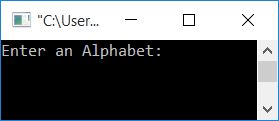
Now supply any alphabet, say U, and press the ENTER key to see the following output:
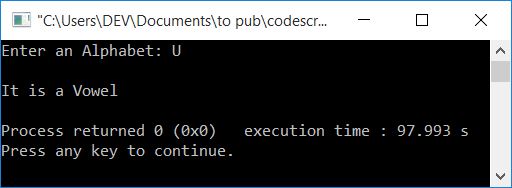
Here is another sample run with user input as c:
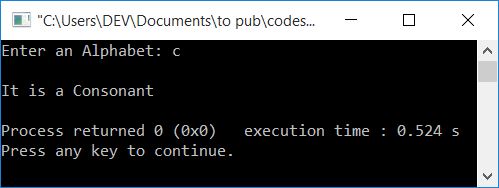
This program has a limitation: if the user enters 4, then the output produced by the above program is "It is a consonant." But 4 is not a consonant; rather, it is a number. Therefore, we have another program to deal with this type of input.
What if the user enters neither a vowel nor a consonant?
The program given below is the solution to user input that is neither vowel nor consonant:
#include<iostream> using namespace std; int main() { char ch; cout<<"Enter the Character: "; cin>>ch; if((ch>='a' && ch<='z') || (ch>='A' && ch<='Z')) { int lowerVowel, upperVowel; lowerVowel = (ch=='a' || ch=='e' || ch=='i' || ch=='o' || ch=='u'); upperVowel = (ch=='A' || ch=='E' || ch=='I' || ch=='O' || ch=='U'); if(lowerVowel) cout<<"\nIt is a lowercase Vowel"; else if(upperVowel) cout<<"\nIt is an uppercase Vowel"; else cout<<"\nIt is a Consonant"; } else cout<<"\nIt is neither Vowel nor Consonant"; cout<<endl; return 0; }
Here is an example of a run with user input as 4:
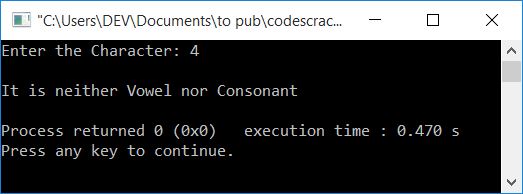
And here is another sample run with user input as E:
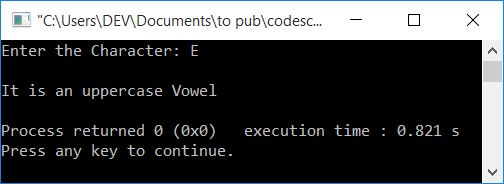
The statement,
lowerVowel = (ch=='a' || ch=='e' || ch=='i' || ch=='o' || ch=='u');
initializes 1 to lowerVowel if the value of ch gets matched to any of the characters a, e, i, o, or u. Because 1 is a condition that the if block treats as true, program flow is directed inside the if's body if lowerVowel remains at 1. Otherwise, in a similar way, the if-else block gets executed. And if both the lowerVowel and upperVowel do not retain their value of 1, else's body is executed, and a message is printed; "It is a Consonant."
Using the switch, check the vowels
This is the last program that uses switch case to check and print whether an input character is a vowel or a consonant:
#include<iostream> using namespace std; int main() { char ch; cout<<"Enter an Alphabet: "; cin>>ch; switch(ch) { case 'a': case 'A': case 'e': case 'E': case 'i': case 'I': case 'o': case 'O': case 'u': case 'U': cout<<"\nIt is a Vowel"; break; default: cout<<"\nIt is a Consonant"; break; } cout<<endl; return 0; }
It will produce the same output as the very first program in this article.
The same program in different languages
You might enjoy the following program in another programming language:
« Previous Program Next Program »